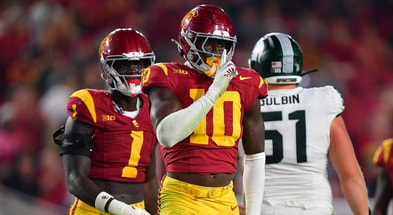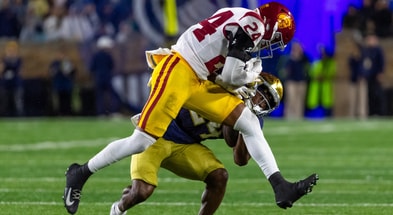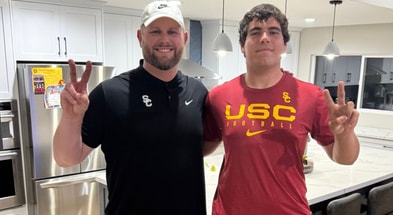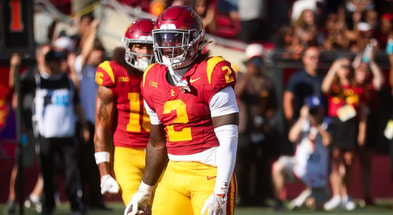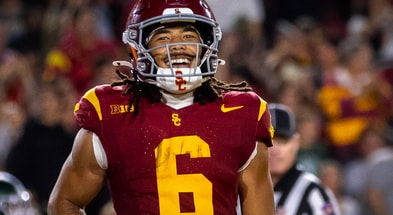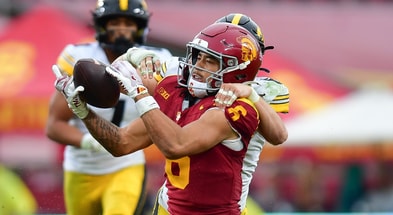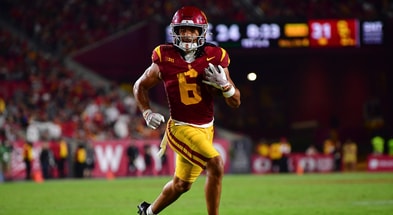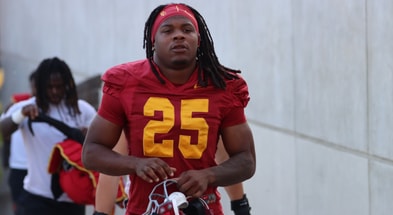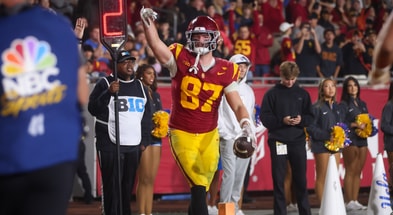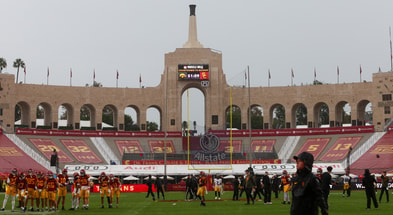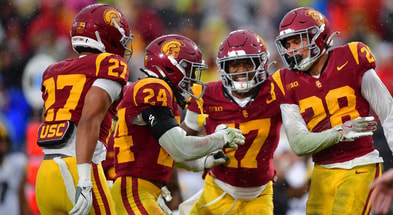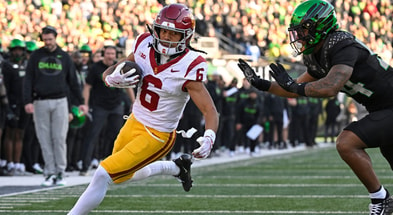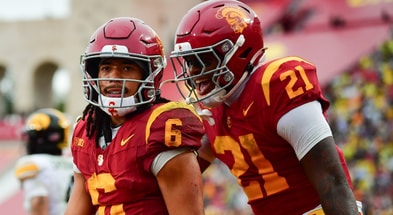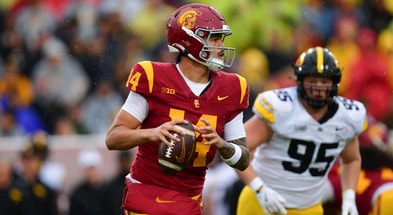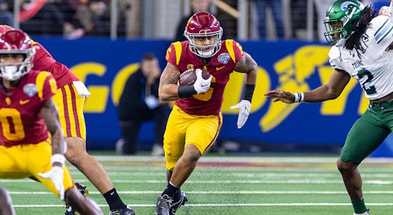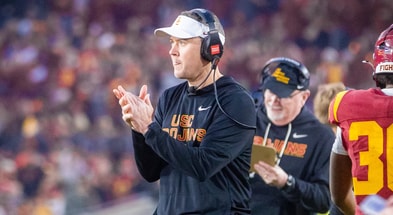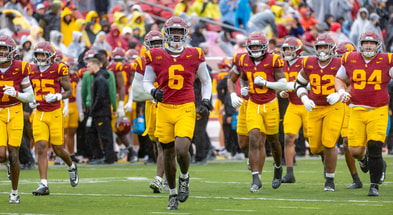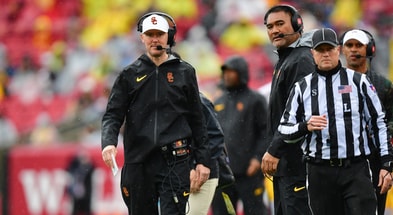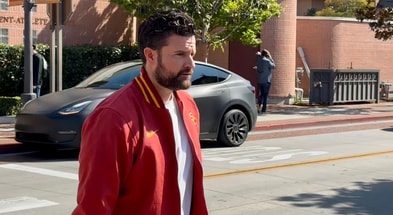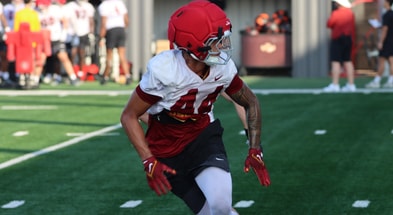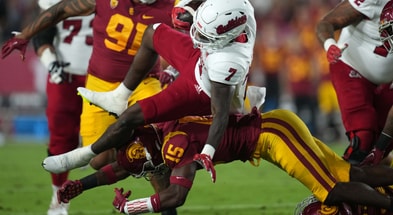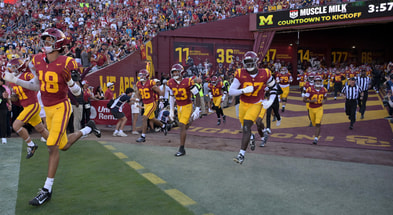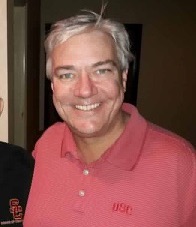Musings from Arledge: The price of the transfer portal
If you’re fed up with the current state of college football and are hoping for some changes, don’t fret; the people whose greed set up this system are still in charge.
It’s hard to see the problem when ratings are still solid and the new playoff will make gigantic sums. The money is still rolling in. TV sets are still tuned to the games. But I think the cracks are starting to show. And how could they not?
Right now, there are a whole series of unlicensed agents who are running around making promises to young men—who, being young men, have little life experience and little common sense—about what they can get them in the marketplace. Teams are gutted on an annual basis as a result. And nobody knows how to gauge the credibility of those promises because, unlike every other professional sport, compensation agreements are not public. So nobody really knows what everybody else is making. There’s no known market. It’s all rumor and innuendo.
If only Lloyd Lake would have waited 20 years, he could have really started a thriving business. Now college football is filled with Lloyd Lakes and handlers and pseudo agents and parents and kids who know little about business or the actual marketplace but are convinced this is their big chance to get that new car or move into a nicer neighborhood. What could go wrong?
College football is big, big business run like no other business on earth. In what other industry did the owners band together to insist that the labor make nothing so the owners could keep all the profits? Okay, I can think of one, but that was a long time ago. With a system like that in place, the artificial restraint on paying valuable labor creates a black market for that valuable labor, a black market that the NCAA sometimes punished and sometimes didn’t, depending on their own whims and prejudices. That system had to go.
But it turns out when you unwind such a ridiculous system, you’re left with stupidity. Now players can get paid but still not by their employers. Compensation is the key factor that determines where the labor goes—as in most employment markets—but all compensation payments are off the books and funded by third party volunteers who donate the money. That way the owners of the teams can continue to keep all their profits and do with it as they please. They can, for example, fund a bunch of programs that consumers don’t want to pay for—like many of the Olympic sports—but which are great for attracting rich kids from Palo Alto who are very good students and will make fine heart surgeons someday. And the schools can use that money to crow about their commitment to Title IX when, in reality, they’re not paying the costs for Title IX. The team’s star quarterback is. He’s the one helping to generate millions of dollars he’ll never see.
How does a business make sound financial decisions when all of the labor costs are off the books? Most professional sports leagues have a salary cap to aid competitiveness. Major League Baseball obviously does not, but at least the Dodgers and Yankees have to balance their books. They don’t ask a local billionaire to pay Shohei Ohtani’s salary through a donation so they can keep the revenues he generates. As unfair as it may be for the Dodgers and Yankees to afford pay rolls that the A’s and Royals can’t, at least the Dodgers and Yankees have to fund their own payrolls. MLB success isn’t determined by which franchise can find the richest dude to make the biggest donations. The Patriots can’t avoid the salary cap by having Phil Knight donate $50 million to the team’s quarterback. That system would destroy the NFL. Just like it’s going to destroy college football if it isn’t fixed.
Now the schools have—under coercion—agreed to pay for a small part of their labor costs, so many of these institutions are panicking. How can we possibly survive if we actually have to share some of our profits with the people who generate them!?
And because that corrupt, unjust system has collapsed under the weight of its own corruption and injustice, we have no common-sense rules and nobody to enforce the ones we pretend to have. So entire teams can just get up and leave every single year. Can you imagine if a professional sports league had two free agency periods every single year for every person on the roster? How could you ever plan for the long-term? Everything is a crisis to be solved this very minute. Your time horizons are all in six-month increments. It is madness.
And this means that every problem in a program is magnified. USC fans are upset that its players are jumping in the portal. That isn’t a USC problem; everybody is dealing with that problem. But the ability of players to jump into the portal twice a year and the prevalence of ethically challenged agents constantly making promises of the riches if they go has created problems everywhere. How do you enforce discipline in your team with such a culture? How do you tell a kid that he needs to sit if he’s not going to study the playbook? How do you develop kids that need development? How do you make decisions on playing time in a system like this when potentially millions of dollars are at stake and agents are saying they have to move right now or they’ll leave big money on the table?
Every culture problem in your program becomes a money problem that leads to portal exodus. Unhappy with the coach? Leave. Every attempt to hold players accountable is a reason to listen to one of those unscrupulous agents. Don’t want to work hard? Leave. And every failure to hold players accountable upsets his teammates who are doing the right thing. What’s the answer for them? Leave. Every playing time decision is a reason to leave. Only six carries last week? Leave.
The players are acting like mercenaries without loyalty because the system has made everybody a mercenary without loyalty.
College football is a wildly popular professional sport—that has none of the rules that make professional sports workable. No draft (and that probably isn’t appropriate here anyway; why should a kid be forced to attend Oregon if he has the grades and SAT scores to attend Washington?), no enforceable free-agency rules, no long-term contracts. And no sense of anything longer than the here and now.
And it turns out, if you’re always scrambling for a check to hold your roster together in the here and now, not only can you not anticipate and solve future problems, but you apparently can’t safeguard your past. In a mad scramble for money, just about every major university has set fire to its own traditions. No rivalry is too important to scrap. No conference affiliation too ridiculous to contemplate. Do whatever you must to make more and more money.
And as a result what we have is not what we all used to love. In the old days, I would tell people that I loved college football and only liked the NFL because Junior Seau and Ronnie Lott would always be Trojans. Today, that’s no longer true. Kyle Ford went from USC to UCLA and back to USC. Who could imagine such a thing?
So we have a distasteful circus—nonsensical, but exciting. USC is losing players to other schools for all kinds of reasons, some of them good, some of them bad, and sometimes just because they think they can get paid more elsewhere. In many cases, they want to get paid for more than they are worth based on their production and effort.
Top 10
- 1Breaking
Kalen DeBoer
Addresses link to Michigan job
- 2New
Predicting AP Poll
Projecting shakeup in Top 25
- 3Hot
Diego Pavia
Calls out Heisman voters
- 4
Jon Sumrall
Intel on new Florida staff
- 5Trending
Heisman Voting
Final vote totals released
Get the Daily On3 Newsletter in your inbox every morning
By clicking "Subscribe to Newsletter", I agree to On3's Privacy Notice, Terms, and use of my personal information described therein.
Duce Robinson is going to transfer. I don’t know why. I do know in the old days, USC would be trying to figure out how to get actual production from Robinson’s unbelievable physical gifts. If I had been born with Robinson’s athletic gifts, I would have been a two-time All-American and high NFL draft pick. He likely won’t be. He has everything you want in a receiver. Except production. And maybe heart. And, yes, that last sentence is harsh, but we’re talking about a guy who should dominate every Saturday: 6’6” with those arms and that speed?! He’s a unicorn, a one-in-a-million talent. But he plays soft like he doesn’t really care. Maybe he does; I only watch the games. A guy that should be a cheat code on 50-50 balls rarely fights for the ball or fights through the defender to draw a PI. In the old days, you would still have hope. He’s only a sophomore. He would be an assistant coach’s primary project this offseason. It would be all about developing Duce. Not now. Duce will be somebody else’s project soon.
We lose our players every year at this time, so we sit around hoping USC will overpay for some other fan base’s favorite players so we can get some mercenary help ourselves. It’s the only way to survive. Let’s find another Woody Marks. But Woody Marks, who is a very good player and probably a fine kid, will never be remembered the way Rodney Peete and Marcus Allen are remembered, because he wasn’t really one of us. He was around for less than a single calendar year. He, like everybody that jumps into the portal for a year, was a drive-by addition to the roster, seasonal help like what the retailers do at Christmas. Leo’s girlfriends stick around longer. Goodbye, Woody, we hardly knew you.
And he hardly knew us. The one-year transfers, most from other parts of the country, don’t know anything about USC-UCLA or Traveler. They’re just collecting a paycheck for four months. It’s not their fault. If you dropped me into Wisconsin or Tennessee, I would know very little about their football traditions and culture, and if I were only going to be there for four months, I would care even less about learning it.
The problem here isn’t Duce Robinson or Woody Marks or any of the other young guys, even those young guys who are acting like mercenaries in a mercenary system. The problem is an obviously broken system. And nobody to fix it. When the only options being thrown around are collective bargaining agreements and the United States Congress you knew that the sport we love is truly and royally screwed.
As a kid, I would watch every game I could, every day. Lakers are on? Yep. Dodgers? Of course. The old Inside the NFL with the slow-mo of passes from Dan Fouts or Joe Montana while the triumphant music played and the baritone-voiced narrator described the previous week’s games? Wouldn’t miss it.
I got older. As I did, my interest in all other sports has waned. I’ll still watch when I can, but none of them is a priority. Only the passion for USC football remained. I plan around that. There are twelve holy days a year, I’ve often said, and we do not conduct business on those days. Since moving to Texas I have given up my season tickets, but I still spend a fortune to attend a lot of the games. And I spend hours a week writing articles and making videos—at a net economic loss—because I love college football and I especially love USC football.
If the current trajectory of college football holds … we’ll see.
It’s not the losing, although the losing hurts. I’ve handled plenty of losing. I fell in love with USC football during Tollner’s tenure, after all. It was September of 1984, USC against LSU at the Coliseum, and it was ugly for the good guys. It was my first time in the Gray Lady, and I loved it, couldn’t get enough. The upset of Washington and the Rose Bowl win over Ohio State that year cemented it. USC football was my thing.
And that hasn’t really changed. My love survived the last few years of Larry Smith, the disappointment of JRII, the atrocity that was Hackett’s time at the helm, the comedy of incompetence that came with Clay, Pat, and Lynn, and even the shocking realization that Lincoln Riley was the last person in the world to realize that Alex Grinch was inept as Grinch cost USC at least one playoff spot and arguably two. I sat through all of that nonsense and still loved USC football.
So it’s not the losing. It’s everything else. I’m not sure how much longer I’m willing to be emotionally invested in this.
There is a precedent. I was a die-hard Dodgers fan for all of my young life. When the Dodgers traded Mike Piazza, I was furious. They were trading away my favorite player for reasons that didn’t appear to be sound baseball reasons. In my anger, I decided to stop watching them for a while. So I did … and I never went back. Having been given a reason for ending that emotional investment temporarily, I lost it forever. That was unexpected, but my life was just fine without it.
As for now, I’m still here. I still care. I’m just not sure how much longer I’ll care. For the first time since I was ten years old, I’m wondering if I’ll still be emotionally invested in USC football five years from now. For me, and probably for many of you, the love affair may soon be over. Maybe in a month, maybe two years from now, probably longer. But if things don’t change, my emotional investment will die, and so will yours.
